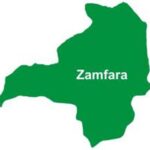The biggest story of the 2023 gubernatorial elections in Nigeria, for me, is the emergence of Dauda Lawal as the governor of Zamfara State. It should easily be the biggest flex that will be used by INEC and by extension, President Buhari himself, to justify the 2022 Electoral Act. This is not only because an incumbent governor was denied re-election (which always comes as a surprise in Nigeria). It is also not because the voters were not induced to vote for the ruling party. The exercise was a ‘fair’ appraisal of the performance of the existing administration and the acceptance (or otherwise) of the status quo.
Since 1999, Zamfara State has been pillaged, misgoverned, neglected and bled dry by an unfortunate crop of leaders. Think of all of the worst developmental indices used to rank the 36 states in Nigeria, you will find Zamfara among the worst six. This could be in education and out-of-school children, health and maternal mortality, extreme poverty and hunger. All of these logically led to the security challenges the state is currently facing. It was too much for the people to take and things had to change.
The consecutive years of abuse, internal displacement and underdevelopment has stretched the elasticity of tolerance for failure on the part of the people of Zamfara State to a ‘snapping’ point.
Therefore, it was ironic, as much as it was shocking and heart-warming that the same governor who was said to have ‘delivered’ his state to his party during the presidential elections will fail to ‘deliver’ the state to himself for a second term in office. This is even more amusing when all but one of the former governors in the state had united against the eventual winner, Lawal. It was basically Dauda Lawal and the people of Zamfara versus Bello Matawalle and the most powerful politicians in the state, with the newly introduced technology, Bimodal Voter Accreditation System (BVAS), as the game-changer. With BVAS, a polling unit cannot have more voters than the actual people that turned out to vote. What this means is that the total votes that will be cast (and recorded as such) must be equal to the total number of people accredited by the BVAS device. Simple.
There were little surprises then, when there was a relatively lower voter turn-out compared to previous election cycles. Inflation of votes is no longer possible, which was why voter intimidation and inducement were most prevalent. This largely favoured the governor-elect, Lawal.
Be that as it may, the choice of the people in Zamfara and the obvious competence of Dauda Lawal are two dependent variables and would be inconsequential without the ‘BVAS factor’. These three have combined to bring the needed change, sending Bello Matawalle out of Gusau’s seat of power and into retrospection for at least another four years.
Aliyu Sulaiman wrote from Katsina email:

 Join Daily Trust WhatsApp Community For Quick Access To News and Happenings Around You.
Join Daily Trust WhatsApp Community For Quick Access To News and Happenings Around You.


